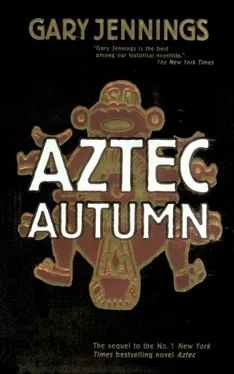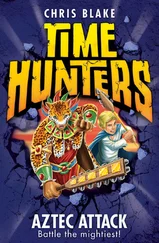Gary Jennings - Aztec Autumn
Здесь есть возможность читать онлайн «Gary Jennings - Aztec Autumn» весь текст электронной книги совершенно бесплатно (целиком полную версию без сокращений). В некоторых случаях можно слушать аудио, скачать через торрент в формате fb2 и присутствует краткое содержание. Жанр: Старинная литература, на английском языке. Описание произведения, (предисловие) а так же отзывы посетителей доступны на портале библиотеки ЛибКат.
- Название:Aztec Autumn
- Автор:
- Жанр:
- Год:неизвестен
- ISBN:нет данных
- Рейтинг книги:4 / 5. Голосов: 1
-
Избранное:Добавить в избранное
- Отзывы:
-
Ваша оценка:
- 80
- 1
- 2
- 3
- 4
- 5
Aztec Autumn: краткое содержание, описание и аннотация
Предлагаем к чтению аннотацию, описание, краткое содержание или предисловие (зависит от того, что написал сам автор книги «Aztec Autumn»). Если вы не нашли необходимую информацию о книге — напишите в комментариях, мы постараемся отыскать её.
Readers familiar with Mexican history will welcome the rich details of this vengeance drama; those new to it will be impressed by Jennings's exhaustive research.
Aztec Autumn — читать онлайн бесплатно полную книгу (весь текст) целиком
Ниже представлен текст книги, разбитый по страницам. Система сохранения места последней прочитанной страницы, позволяет с удобством читать онлайн бесплатно книгу «Aztec Autumn», без необходимости каждый раз заново искать на чём Вы остановились. Поставьте закладку, и сможете в любой момент перейти на страницу, на которой закончили чтение.
Интервал:
Закладка:
So much was known; outsiders had to conjecture the rest, and they made up various legends to fit the circumstances. The most credible supposition was that there had to be some land out there west of Yakóreke—islands, maybe, surrounded by shoal waters—because it would be impossible for any fishermen to dredge up oysters from the great depths of the open sea. But why did the men go out only once a year? Perhaps they kept slaves on those islands, collecting oyster-hearts all year round, and saving them until their masters came at an appointed time, bearing goods to trade for the pearls.
And the fact that the fishermen told their secret only to their sons, not to the females of Yakóreke, inspired another touch to the legend. Those supposed slaves on those supposed islands must be females themselves, and the Yakóreke women must never know, lest they jealously prevent their menfolk from going there. Thus grew the legend of The Islands of the Women. All my young life I had heard that legend and variants of it—but, like everyone else of good sense, I had always dismissed the tales as mythical and absurd. For one reason, it was foolish to believe that an isolated populace all female could have perpetuated itself over so many lifetimes. But now, by pure chance, I had found that those islands did and do exist in fact. I would not have survived if they did not.
The islands are four, in a line, but only the middle two, the largest, have sufficient fresh water to allow of population, and they are populated entirely by women. I counted at that time one hundred and twelve of them. I should more accurately say females instead of women, since they included infants under a year old, small children, nubile girls, young women, mature women and old women. The most ancient was the one they called Kukú, or Grandmother, she whom they all obeyed as if she had been their Revered Speaker. I made a point of looking at all the children—they wore not even a maxtlatl—and the very youngest of them, the very newest born, were of the female sex.
Once I had convinced the women that I had indeed come to their islands inadvertently, unknowing of their existence—not even believing in them—their Kukú gave me leave to stay awhile, long enough to regain my strength and to carve for myself a new canoe paddle, both of which I would need to get back to the mainland. The young woman who had first succored me with a spongeful of water was commanded to see to my sustenance, and to see that I behaved myself, and she seldom let me out of her sight during the first days of my stay.
Her name was Ixínatsi, which is the Poré word for that tiny chirping insect called a cricket. The name was apt, for she was as perky and sprightly and good-humored as is that little cricket creature. To the casual eye, Ixínatsi would have seemed just another Purémpe woman, though of a countenance unusually gorgeous to look at and a demeanor never less than vivacious. Any observer could admire her sparkling eyes, glossy hair, luminous complexion, beautifully rounded, firm breasts and buttocks, shapely legs and arms, dainty hands. But only I and the gods who made her would ever know that Cricket was in fact very different—darlingly and deliciously different—from all other women. However, I am getting ahead of my chronicle.
As old Kukú had bidden her, Cricket cooked for me—all kinds of fish, and garnished the dishes with a yellow flower called tirípetsi; the flower, she said, possesses curative properties. Between meals she plied me with raw oysters and mussels and scallops—in much the same way that some of our mainland peoples forcibly feed their techíchi dogs before slaughtering them for food. When the comparison occurred to me, it made me uneasy. I wondered if the women were manless because they were man-eaters, and I inquired, which made Ixínatsi laugh.
"We have no men, for eating or for anything else," she said, in that dialect of Poré which I was hurrying to learn. "I feed you, Tenamáxtli, to make you healthy again. The more quickly you get strong, the more quickly you can go away."
Before I went away, though, I wished to know more about those legendary islands, besides the obvious fact that they were no baseless legend. I could surmise for myself that the women had had Purémpe ancestors, but that those ancestors had departed from their native Michihuácan long, long ago. The women's altered language was evidence of that. So was the fact that they did not follow the very old Purémpe fashion of shaving their heads bald. When Cricket was not busy gorging me with food, she had no qualms about answering my many questions. The first thing I asked was about the women's houses, which were not houses at all.
The islands, in addition to their being fringed with coconut palms, are heavily forested with hardwood trees on their upper slopes. But the women live all day in the open and at night, to sleep, they crawl into crude shelters underneath the many fallen trees. They had dug small caves under them or, where a trunk leaned at an angle, they had walled in the space with palm leaves or slabs of bark. I was lent one of those makeshift nooks for my own, next to the one occupied by Ixínatsi and her four-year-old daughter (named Tirípetsi, after that yellow flower).
I asked, "Why, with all these trees, do you not cut them into boards for building decent houses? Or at least use the saplings, which do not require slicing?"
She said, "It would be of no use, Tenamáxtli. Too often, the rainy season brings such terrible storms that they scour these islands bare of anything movable. Even the strong trees, many of them are blown down each year. So we make our shelters under the fallen ones, that we may not be blown away. We build nothing that cannot easily be rebuilt. That is also why we do not try to grow crops of any sort. But the sea gives us abundant food, we have good streams for drink, coconuts for sweets. Our only harvest is of the kinúcha, and we trade them for the other things we need. Which are few," she concluded and, as if to illustrate, swept her hand down her all but naked body.
The word kinúcha of course means "pearls." And there was good reason why the island women needed little from the world across the sea. All except the youngest girls spent every day hard at work, which tired them so that they passed their nights in deep slumber. Barring the brief intervals they allowed themselves for eating and obligatory functions, they worked or they slept, and they could imagine no other activities. They were as indifferent to the ideas of diversion and leisure as they were to the lack of male mates and boy children.
Their work is certainly demanding—and unique among feminine occupations. As soon as the day is light enough, most of the girls and women either swim out into the sea or push out on rafts made of vine-lashed tree limbs. Each woman carries looped to her arm a basket made of loosely woven withes. From then until the light fades at dusk, those women dive repeatedly to the bottom of the sea, to pry loose the oysters that abound there. They surface with a basket full of the things, empty them onto the beach or their raft, then dive to fill it again. Meanwhile, the girls too young and the women too old to dive do the drudgery of opening the oysters—and throwing away almost all of them.
The women do not want the oysters, except for the comparatively few they eat. What they seek are the oysters' kinúcha, the hearts, the pearls. During my stay in the islands, I saw pearls enough to have paid for raising an entire modern city there, if a city had been wanted. Most of the pearls were perfectly round and smooth, some were irregularly bulbous; some were as small as a fly's eye, some as large as my thumb end; most were of sizes varying between those extremes. Most, also, were a softly glowing white, but there were pinks and pale blues and even an occasional kinú the silver-gray color of a thundercloud. What makes pearls so esteemed and so valuable are their rarity and difficulty of acquisition, though one would suppose that if any oyster has a heart, they all should.
Читать дальшеИнтервал:
Закладка:
Похожие книги на «Aztec Autumn»
Представляем Вашему вниманию похожие книги на «Aztec Autumn» списком для выбора. Мы отобрали схожую по названию и смыслу литературу в надежде предоставить читателям больше вариантов отыскать новые, интересные, ещё непрочитанные произведения.
Обсуждение, отзывы о книге «Aztec Autumn» и просто собственные мнения читателей. Оставьте ваши комментарии, напишите, что Вы думаете о произведении, его смысле или главных героях. Укажите что конкретно понравилось, а что нет, и почему Вы так считаете.











